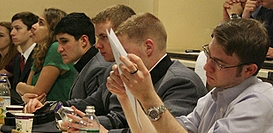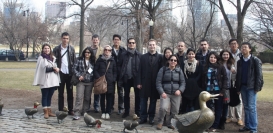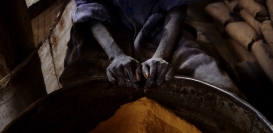Symposium 2014
The Future of the Middle East and North Africa
The 29th Annual Norris and Margery Bendetson EPIIC International Symposium
Wednesday, February 26 to Sunday, March 2, 2014
Watch the Symposium panels on YouTube
Collapse of Sovereignty: The State of the State Report
Civil-Military Relations and Security Sector Reform in Political Transitions
Keynote Address: America and a Changing Middle East, William J Burns
US Foreign Policy and Security in the Middle East and North Africa
Vying for In uence: Iran and Saudi Arabia
Israel’s Strategic View of the Middle East and North Africa
International Institutions and Intervention
The Unraveling of Syria Part 1/Part 2
Keynote Address: American Policy and the Arab Revolutions, R. Nicholas Burns
Border Crossings: Refugees, Jihadists, Money, and Arms
The Impact of the World Bank in the Middle East and North Africa
Education, Entrepreneurship and Economic Development
Overview
The Symposium will feature five days of intense and wide-ranging discussion on The Future of the Middle East and North Africa. Against the backdrop of the 100th anniversary of World War I, the Symposium will comprehensively examine an extensive and volatile region ranging from Morocco to Iran, Algiers to Sana’a, Ankara to Muscat. Home to 380 million people and 60 percent of the world’s oil reserves, MENA is an intense geopolitical arena marked by political instability, human insecurity, and inequality, with 23 percent of its population living on less than $2 a day.
Power transitions in MENA both prominent and hidden are challenging regional security, international security, and U.S. foreign policy. How will regional powers contend with the Syrian crisis, the developing US-Iran rapprochement, and assertive non-state actors, from Hezbollah to the Islamic State of Iraq and the Levant (ISIS)? What is the future of the Kurds? With the demise of pan-Arabism and secular socialism, what is the future of the Arab state? How are abortive revolutions and counterrevolutions shaping life and the political aspirations of the generations coming of age? The Symposium will address these questions and more.
The Symposium will feature leading voices from the MENA region. There will be eleven panels of structured inquiry and debate, two keynote addresses, expert-led intimate discussions, and a professional workshop. The panels will examine the demise of authoritarian figureheads, new modes of Islamic politics, civil-military relations, U.S. foreign policy, Iran-Gulf geopolitics, humanitarian intervention, the unravelling of Syria, the refugee experience, the promise of entrepreneurship, and the changing status of women. Cultural celebrations will bookend the weekend's discussions.
Participants will come from the Carnegie Endowment for International Peace, the International Crisis Group, the United States Institute for Peace, The Hague Institute for Global Justice, The Naval Post Graduate School, The National Defense University, Jadaliyya, The Arab Studies Institute, the Palestine Research Center, the Jerusalem Center for International Affairs, Harvard’s Belfer Center for Science and International Affairs, Northeastern’s Middle East Center for Peace, Culture and Development, Questscope-Jordan, and The Crown Center at Brandeis. International student delegations will attend from Brazil, China, Iraq, Israel, Russia, Singapore, South Korea, as well as the U.S. Air Force Academy, U.S. Military Academy at West Point, U.S. Naval Academy at Annapolis, and U.S. Coast Guard Academy.
To Attend
The Symposium will be held at different locations on the Tufts Medford Campus, including Cabot Intercultural Center, Cohen Auditorium, and 51 Winthrop St. Campus map available here.




